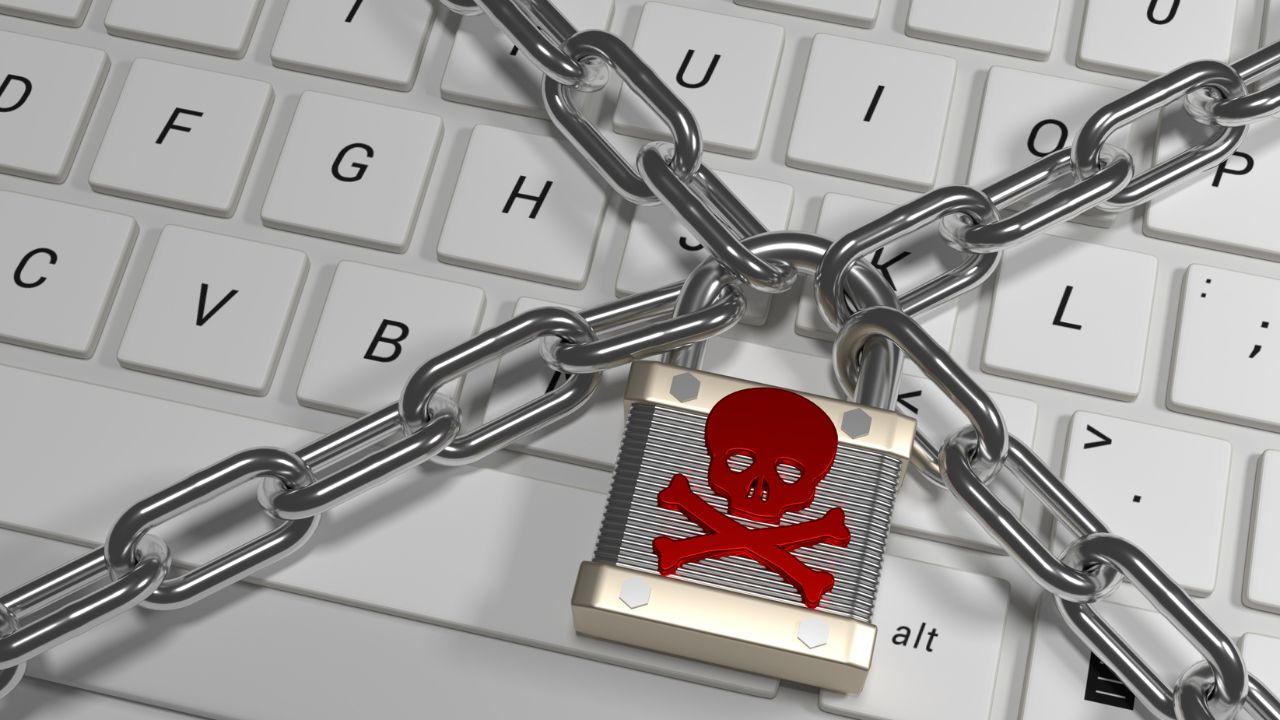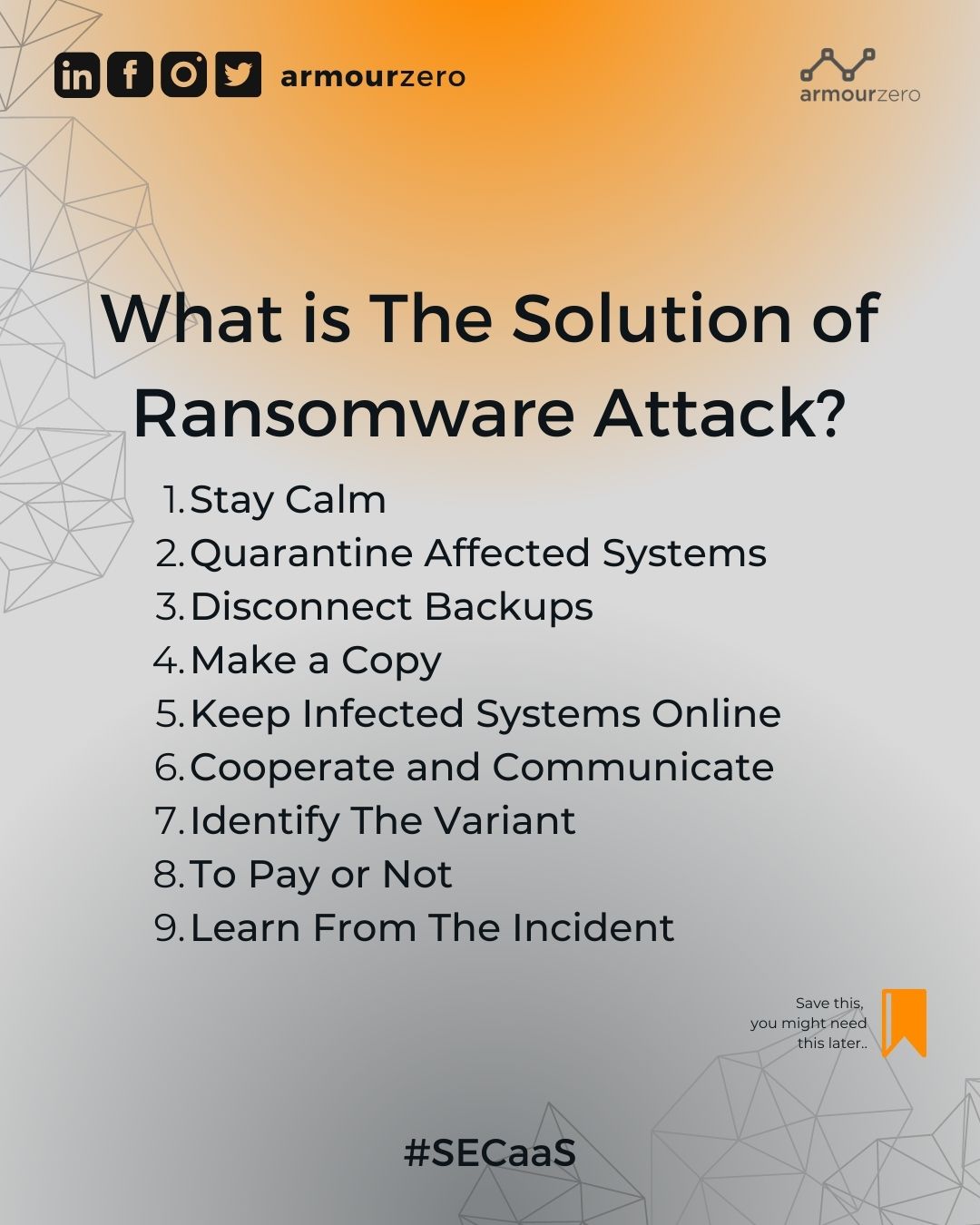9 Steps to Recover Your Business
From a Ransomware Attack!

Ransomware is a type of cyberattack that uses malware to encrypt files on a computer system and then demands a ransom for the decryption key.
There are two primary types of ransomware, called crypto-ransomware that encrypts an organisation’s data and demands a payment to decrypt and return the information safely. And there is one type, called locker-ransomware, that is similar to the usual ransomware in that it restricts users from accessing files rather than encrypting them before demanding a fee to “unlock” the data.
In both circumstances, the attacker demands payment and threatens to disclose sensitive information or delete data permanently if the victim does not pay.
What is The Solution of Ransomware Attack?
If you’ve been infected, take these steps to manage the impact of the incident and prepare for ransomware recovery:
1. Stay Calm
Ransomware attacks can be stressful, but rushing into things can mean making major mistakes. Keeping a cool head while recovering from ransomware is critical to making the best decisions.
2. Quarantine Affected Systems
Ransomware frequently attempts to spread across a network in order to infect as many systems as possible. Disconnecting infected systems from the rest of the network can help prevent the encryption of other data.
3. Disconnect Backups
Ransomware frequently targets backup systems because criminals know that rather than paying the ransom, enterprises would attempt to retrieve data from backups. Don’t connect any backups to the infected computer and quarantine any backups that may be infected.

4. Make a Copy
Ransomware decryption isn’t always successful, as decryptors are always being improved. If something goes wrong, making a copy of encrypted data may allow it to be recovered later.
5. Keep Infected Systems Online
Some ransomware variations might make infected systems unstable, leaving them in an unrecoverable state after a reboot. While attempting to remove the ransomware, do not attempt to reboot or update affected systems.
6. Cooperate and Communicate
Reach out to law enforcement, regulators, and other stakeholders and consider contacting a reputable incident response team. They may have specialised knowledge or additional resources to help solve the problem.
7. Identify The Variant
There are numerous ransomware variations in circulation, and the list is continuously changing.
8. To Pay or Not
This is a challenging question. On the one hand, paying the ransom could result in a quicker and less expensive recovery. Paying, on the other hand, offers no assurance of recovery and gives the attackers the resources they need to continue their actions.
9. Learn From The Incident
The ransomware got into your systems in some way. To prevent future attackers from using the same approaches, identify the infection vector and close it.
The key is knowing what to do when it happens and being able to securely restore your data once your machine has been cleaned of all malicious malware.
Of course, you’ll need copies of your files kept safely somewhere to be able to restore your data. As a result, keeping three copies of your data in two separate locations is recommended, with at least one of the copies being saved in a different medium than the others, such as object storage, cloud-based storage, or on a disc.
If you don’t have time to do these steps to recover your data, or you don’t want to spend so much money to pay the hackers, then you should protect your company’s data. Protection is now very easy and affordable with ArmourZero, your all-in-one cybersecurity solution. Just pay for what kind of protection you need, and you’ll get the licence, guideline, monitoring, alert and report. Go get your protection here.

Written by:
Amirul Ehsan, experienced IT Security Engineer in the information technology and services industry.
Share this post
Related Posts

Earth Day: The Connection of Cybersecurity and Sustainability
- 22 Apr 2024
- By:Fanny Fajarianti
- Category: ArmourHacks
Uncover the link between Earth Day and Cybersecurity, promoting sustainability through data protection and environmental stewardship. Let’s secure a greener future.

What is DevSecOps? Definition & Best Practices for Tech Industries
- 18 Apr 2024
- By:Bernadetta Septarini
- Category: ArmourHacks
Learn about DevSecOps, principles, and best practices for the tech industry. Integrate security seamlessly into software development and enhance quality.

Safeguarding Your Organisation During the Hari Raya Holiday
- 09 Apr 2024
- By:Bernadetta Septarini
- Category: ArmourHacks
Protect your organisation from holiday cyberattacks during Hari Raya. Learn more about the risks and best practices for holiday security with ArmourZero.

Cyberattacks: A Growing Threat to Higher Education
- 02 Apr 2024
- By:Fanny Fajarianti
- Category: ArmourHacks
Universities hold sensitive data but face cyberattack risks in the digital age. Explore the impact of cyberattack and learn how to protect your institution.

